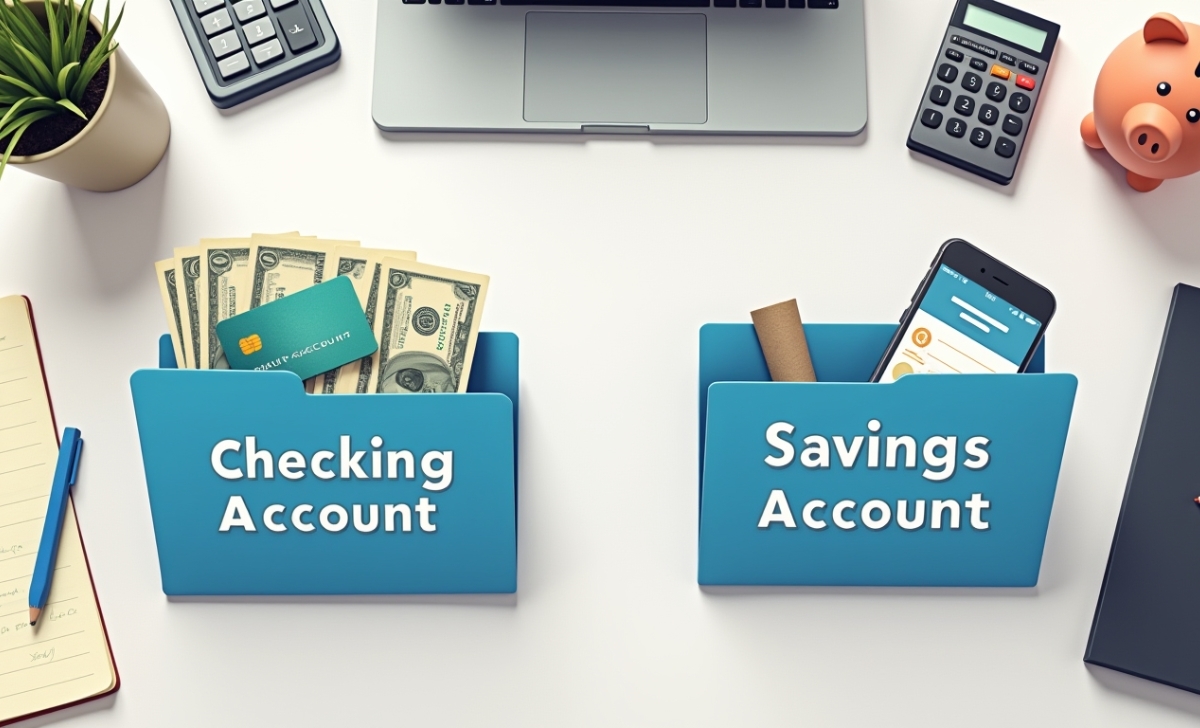Are you a small business owner searching for the best bank for small business that fits your unique needs? Navigating the world of small business banking can be overwhelming, especially with the countless options available today. From business loans to digital banking tools, selecting the best bank for small business can be the difference between your business thriving or merely surviving.
But what exactly should you look for when deciding on the best bank for your small business? Is it the low fees, the accessibility of business credit, or perhaps the convenience of mobile banking features? These questions are crucial, and understanding your business’s specific requirements will set you up for success.
In this guide, we’ll break down everything you need to know—from evaluating business account fees to comparing banking options—so you can make a well-informed choice. Whether you’re just starting out or looking to switch to a more supportive bank, this post will provide the insights and tools necessary for your small business’s financial growth. Ready to discover the perfect banking partner for your business success? Let’s dive in.
Key Takeaways
- Choosing the right bank can significantly influence your small business’s growth and success.
- Low-fee banking options are essential to minimize costs and maximize your profits.
- Access to small business loans and credit lines provides financial flexibility for expansion.
- Digital banking tools and mobile apps offer convenience and real-time financial management.
- Personalized banking support can help you make strategic business decisions and achieve long-term goals.
Understanding the Needs of Small Businesses

When it comes to finding the best bank for your small business, the first step is understanding your business’s unique needs. Every business is different, and what works for one might not work for another. So, how do you identify the right banking services tailored specifically for your business? Let’s break it down.
A. Types of Small Business Accounts You Might Need
One of the most crucial decisions you’ll make is selecting the right type of business account. Here’s a quick overview of the most common ones:
- Business Checking Account: This is the most basic account and a must-have for any small business. It allows you to manage daily transactions, pay vendors, and receive payments efficiently. Look for accounts with low fees and high transaction limits to keep costs down. Learn more about choosing the right business checking account.
- Savings Account: If you’re planning to set aside funds for future growth or emergencies, a business savings account is essential. High-yield options can help your money grow while keeping it accessible when needed.
- Merchant Services Account: Do you accept card payments? If so, a merchant services account integrates with your point-of-sale system, making it easier for your business to accept credit and debit cards, both online and in-store.
By understanding the types of accounts available, you can tailor your banking choices to match your business’s day-to-day needs.
B. Importance of Tailored Banking Services for Small Businesses
Why settle for one-size-fits-all banking when your business deserves more? Banks that specialize in small business services offer features designed to help your business thrive. Ask yourself:
- Do I need access to small business credit? Finding a bank that offers flexible loan options or business credit lines can be a game-changer when it comes to expanding your business.
- Does my business need personalized support? Many banks provide dedicated small business support, giving you access to specialized advisors who understand your industry and can offer strategic advice.
- How important is digital banking? In today’s fast-paced world, having access to digital banking tools and mobile apps can simplify your financial management, whether you’re checking balances, paying vendors, or approving transactions on the go.
A bank that understands small businesses doesn’t just offer basic accounts; it provides tailored services that align with your business goals and growth potential.
C. How to Assess Your Business’s Specific Banking Requirements
Every small business has its own set of needs, and identifying yours is crucial. Here’s how to evaluate your specific requirements:
- Analyze Your Business’s Cash Flow: Is your business cash-heavy, or do you handle more electronic transactions? If cash flow is a priority, consider banks that offer no-fee cash deposits or high ATM availability.
- Evaluate Your Need for Business Loans: If you anticipate the need for financing, choose a bank that provides a range of loan options specifically for small businesses. A good bank should offer competitive rates and flexible terms to support your growth.
- Check for Additional Business Perks: Does the bank offer rewards for maintaining high balances? Are there networking events or workshops for small businesses? These additional perks can add value and help your business succeed.
By taking the time to analyze these aspects, you’ll have a clearer picture of what your business needs, making it easier to select the best bank. Don’t hesitate to explore different options, read customer reviews, and even consult with banking experts to make a well-informed decision.
This approach ensures that your small business is not only choosing a bank but building a partnership that supports your long-term success.
Key Features to Look for in a Small Business Bank

Choosing the right bank for your small business is not just about opening an account; it’s about finding a partner that offers the tools and support you need to succeed. With so many options out there, how do you determine which features matter most for your business growth? Let’s explore the critical aspects that set the best banks apart.
A. Low Fees and Transaction Limits
Fees can eat into your profits, especially if your business conducts numerous transactions. When evaluating banks, look for those that offer:
- No Monthly Maintenance Fees: Some banks waive fees if you maintain a minimum balance, making it easier to avoid unnecessary costs.
- Free Transactions: Find a bank that provides a high number of free transactions per month, whether it’s deposits, withdrawals, or transfers. The more flexibility you have, the better for managing your cash flow.
- Low ATM Fees: If your business relies on cash, access to an extensive ATM network with low or no fees can save you significant money over time.
For a deeper dive into understanding how banking fees work and which ones to avoid, check out this detailed guide on business banking fees.
B. Access to Small Business Loans and Credit Lines
Whether you’re just starting or looking to expand, access to small business loans can be crucial. A bank that offers flexible lending options tailored for small businesses can provide the boost you need. When considering banks:
- Evaluate Loan Types: Does the bank offer term loans, lines of credit, or SBA-backed loans? The variety of loan options can give you more flexibility in financing.
- Check the Application Process: Is it straightforward, with a quick approval timeline? Some banks offer simplified online applications for small business owners, making it easier to get the funding you need quickly.
- Interest Rates and Repayment Terms: Compare rates to ensure they’re competitive. Look for transparent terms and the ability to customize repayment plans based on your business’s cash flow.
For more insights on securing small business loans and what to expect during the process, read this expert analysis.
C. Digital Banking Tools and Mobile App Capabilities
In today’s digital age, convenience is key. Small businesses often need to manage finances on the go, and having robust digital tools can make a significant difference. Consider these features:
- User-Friendly Mobile App: Does the bank’s app offer features like mobile check deposit, balance monitoring, and the ability to make transfers or pay bills with ease? The more comprehensive the app, the more you can handle without visiting a branch.
- Integration with Accounting Software: Many banks offer integrations with popular accounting tools like QuickBooks. This can streamline your financial management, reducing manual work and errors.
- Secure Online Platform: Ensure the bank’s online platform is not only functional but secure, offering two-factor authentication and other security measures to protect your business’s financial data.
If you want to know which banking apps are currently leading the market for small businesses, take a look at this comparison of top mobile banking apps.
D. Dedicated Business Support and Customer Service
The quality of customer support can make or break your banking experience. Having a dedicated business banking advisor who understands your industry can be incredibly beneficial. Look for banks that offer:
- 24/7 Customer Support: Access to round-the-clock support ensures that you can resolve any issues quickly, whether it’s during business hours or late at night.
- Personalized Business Advisors: Some banks assign you a dedicated advisor, giving you direct access to someone familiar with your business and its financial needs.
- Networking Opportunities: Some banks go beyond customer support by hosting business workshops or networking events, helping you connect with other small business owners and experts.
For more information on the benefits of having a dedicated business banking advisor, explore this article on business banking support.
E. Branch Accessibility and ATM Network
While digital tools are essential, having physical branch access can still be beneficial, especially for cash-heavy businesses. Consider:
- Proximity to Branches: Does the bank have branches near your business location? Proximity makes it easier to handle large deposits or speak with an advisor in person.
- Extensive ATM Network: If your business frequently handles cash, a wide ATM network with minimal fees is vital. Some banks even offer fee reimbursement for out-of-network ATMs.
- Branch Services: Check if the branches provide specific small business services, such as notary services or business consultations.
If you’re interested in learning how branch accessibility impacts your business banking experience, read this report on branch banking for small businesses.
By focusing on these key features, you can make an informed decision that aligns with your small business needs. Remember, the best bank isn’t just a financial institution—it’s a partner that supports your growth every step of the way.
Best Bank for Small Business: A Comparative Overview

Choosing the right bank is not a one-size-fits-all decision. It depends on your business’s needs, location, and the type of services you value most. Whether you prefer a traditional bank with physical branches or a digital-first approach, it’s important to weigh the pros and cons. Let’s explore the different options available and how they might fit into your business strategy.
A. National Banks vs. Local Banks: Which Is Better?
Deciding between a national bank and a local bank is often one of the first considerations for small business owners. So, which one should you choose?
- National Banks: These banks offer a wide network of branches and ATMs, making them convenient if you operate in multiple locations or travel often. They also typically have a wide range of business products, from loans to merchant services, which can be beneficial as your business grows.
- Local Banks: If personalized service and local expertise are important to you, a smaller community bank might be the better option. Local banks often offer competitive rates and may have more flexible loan options for small businesses, particularly those rooted in the community. Additionally, they may be more open to working with startups and small businesses with shorter credit histories.
If you’re still unsure which type of bank suits your business, read this comparison of national vs. local banks.
B. Online Banks vs. Traditional Banks: Pros and Cons
The rise of digital banking has opened up new possibilities for small businesses. With many entrepreneurs managing their finances remotely, online banks are increasingly popular. But is an online bank the right fit for your business?
- Pros of Online Banks:
- Lower fees: Many online banks offer zero or minimal fees compared to traditional banks, making them cost-effective for small businesses.
- Easy access: With robust mobile apps and 24/7 online support, you can manage your finances whenever and wherever you want.
- High interest rates: Some online banks provide higher interest rates on savings accounts, allowing your funds to grow faster.
- Cons of Online Banks:
- Limited cash deposits: If your business deals heavily in cash, the lack of physical branches can be a drawback.
- Fewer business services: Some online banks may not offer specialized business services like merchant processing or small business loans, which could limit your options as your business expands.
Traditional banks, on the other hand, still have their advantages, especially if you prefer face-to-face interactions and a comprehensive range of services. If you want to learn more about the benefits and drawbacks of online banks for small businesses, check out this guide on digital banking options.
C. Reviewing the Top 5 Banks for Small Business Banking
To give you a head start, let’s take a look at some of the top banks for small businesses in 2024. These banks are known for their small business-friendly services and competitive rates:
- Chase Bank: Offers comprehensive business solutions, including checking accounts with no fees for new accounts, business credit cards, and easy access to loans. With thousands of branches nationwide, it’s ideal for businesses that value physical access.
- Bank of America: Known for its robust digital tools and small business support, Bank of America provides various business accounts tailored to different needs, including specialized loans for startups.
- Wells Fargo: Provides flexible loan options and a user-friendly mobile app that integrates with accounting software like QuickBooks, making financial management simpler.
- Capital One: If you’re looking for no-fee banking with high ATM accessibility, Capital One might be the right fit. They offer tailored services for small businesses and competitive business credit card options.
- BlueVine (Online Only): An excellent option for entrepreneurs who prefer digital banking, BlueVine offers no monthly fees and high interest rates on business checking accounts, although it lacks physical branches.
For a more detailed breakdown of these banks and their offerings, you can explore this in-depth comparison.
D. Specialized Banks for Niche Businesses (e.g., startups, freelancers)
Certain banks cater specifically to niche businesses like startups, freelancers, or e-commerce entrepreneurs. These specialized banks provide tailored solutions that might not be available at larger institutions.
- Banks for Startups: Some banks focus on startup businesses, offering resources such as venture capital connections, incubator programs, and loans designed specifically for early-stage businesses.
- Freelancer-Friendly Banks: Freelancers often require flexible banking solutions that can accommodate irregular income streams. Look for banks that offer accounts with no minimum balance requirements and integration with payment platforms like PayPal or Stripe.
- E-commerce Banking Solutions: If you run an online store, specialized banks provide tools like seamless merchant services and quick access to loans based on sales volume, which can help your business grow faster.
If you want to discover which bank is the best fit for your niche business, this list of top niche banks provides a great starting point.
Finding the right bank for your small business can be a strategic move that sets your business up for long-term success. By understanding the differences between national, local, online, and specialized banks, you can make an informed decision that aligns with your goals and business model.
How to Choose the Right Bank for Your Business

Choosing the right bank for your small business is more than just opening an account; it’s about finding a financial partner that aligns with your business goals and supports your growth. With so many options available, how can you be sure you’re making the right choice? In this section, we’ll walk through the key considerations to help you make a well-informed decision.
A. Evaluating Fee Structures and Hidden Costs
One of the most important factors when choosing a bank is understanding its fee structure. Banks often have various fees associated with their accounts, and if you’re not careful, these costs can quickly add up. Here’s what to look for:
- Monthly Maintenance Fees: Many banks charge a monthly fee for maintaining your account, but some waive it if you maintain a minimum balance. Check if the bank offers this option to save on costs.
- Transaction Fees: If your business involves frequent transactions, such as deposits, withdrawals, or transfers, look for accounts that provide a high number of free transactions per month. Excess transaction fees can significantly impact your profits.
- ATM Fees: Access to a broad ATM network with low or no fees is critical for cash-heavy businesses. Some banks even reimburse out-of-network ATM fees, so look for these perks.
- Hidden Fees: Always read the fine print. Some banks charge fees for services like wire transfers, overdrafts, and cash deposits. Ensure you understand all potential costs before committing.
B. Checking Loan and Credit Options: What You Need to Know
If your business plans to expand or you foresee the need for financial support, the availability of small business loans and credit lines is crucial. Here’s what to consider when evaluating banks for lending options:
- Variety of Loan Types: Does the bank offer different types of loans, such as SBA loans, lines of credit, or equipment financing? A variety of options gives you flexibility depending on your business needs.
- Competitive Interest Rates: Compare interest rates between banks to ensure you’re getting the best deal. Some banks offer special rates for small businesses or first-time borrowers—these can be great opportunities if you qualify.
- Application Process and Speed: A straightforward, fast approval process can be invaluable when you need funds quickly. Some banks provide online applications with quick decisions, making it easier to get the financing you need without delay.
C. Importance of Personalized Support for Business Growth
Customer support is another critical aspect when choosing a bank. You need a financial partner that offers reliable assistance, especially when unexpected issues arise. Look for the following:
- Dedicated Business Advisors: Banks that assign you a dedicated business banking advisor can be extremely valuable. Having a professional who understands your business’s financial needs allows for personalized advice and tailored banking solutions.
- 24/7 Support Availability: Access to round-the-clock customer support is essential. Whether it’s a late-night transaction issue or a question about your account, knowing you can reach help at any time provides peace of mind.
- Workshops and Business Events: Some banks go beyond offering accounts and loans—they provide small business workshops and networking events. These opportunities can help you connect with other entrepreneurs and grow your business skills.
D. Utilizing Reviews and Customer Feedback in Your Decision
In the digital age, it’s easier than ever to access reviews and customer feedback before making a decision. Here’s how to make the most of these resources:
- Check Online Reviews: Platforms like Yelp, Google Reviews, and Trustpilot can offer insights into other small business owners’ experiences. Look for patterns—are customers consistently complaining about high fees or poor customer service? On the other hand, consistent praise for customer support or convenient banking tools can be a positive sign.
- Ask for Recommendations: Don’t hesitate to ask fellow small business owners about their banking experiences. First-hand recommendations can provide an honest view of what to expect.
- Explore Forums and Business Groups: Online business communities and forums, such as Reddit’s small business subreddit or LinkedIn groups, are excellent places to get unbiased opinions. Members often share their experiences and advice on the best banking options for small businesses.
By leveraging customer reviews and feedback, you can gain a clearer picture of what each bank offers beyond its marketing materials.
By carefully evaluating these key factors, you’ll be well-equipped to choose the right bank for your small business. Remember, your bank should be more than a place to store money; it should be a strategic partner that supports your business’s growth and success.
Setting Up Your Small Business Account

Once you’ve chosen the right bank for your small business, the next step is setting up your account. It’s an exciting moment that signifies growth and preparation for your business’s financial journey. But how do you navigate the process smoothly? Let’s break down each step to ensure your business account is set up efficiently and tailored to your needs.
A. Required Documentation and Information Checklist
Before heading to the bank (or opening an account online), make sure you have all the necessary documentation in order. The more prepared you are, the quicker and easier the process will be. Here’s what you typically need:
- Personal Identification: Valid identification such as a driver’s license, passport, or government-issued ID is essential.
- Employer Identification Number (EIN): If your business is registered, you’ll need your EIN. If you’re a sole proprietor, some banks may accept your Social Security Number instead.
- Business Formation Documents: Depending on your business structure, bring your articles of incorporation, partnership agreement, or sole proprietorship registration. These documents verify that your business is legitimate.
- Operating Agreement: If you run an LLC, some banks may require an operating agreement that outlines the management structure and responsibilities.
- Business Licenses: Some banks request proof that your business is properly licensed in your city or state, especially for regulated industries.
Having these documents prepared ahead of time helps streamline the account setup process, ensuring you can get your business up and running without delays.
B. Navigating the Account Opening Process Step-by-Step
Opening a small business bank account might seem daunting, but it’s a straightforward process when broken down into manageable steps:
- Research and Choose the Right Account: Review the bank’s options to find an account that matches your business needs, whether it’s a basic checking account, a high-yield savings account, or a specialized merchant services account.
- Visit a Branch or Apply Online: Many banks offer online account setup, which can save time and effort. However, if you prefer in-person assistance or need to ask questions, visiting a branch might be the better option.
- Submit Your Documentation: Provide all the necessary documents (as outlined above) to verify your business information. Make sure everything is up-to-date to avoid any issues.
- Set Up Online and Mobile Banking: Once your account is approved, set up digital access through the bank’s online portal and mobile app. These tools are essential for managing your finances on the go.
- Fund Your Account: Most banks require an initial deposit to activate your account. This can vary, so check with your bank on the minimum deposit amount.
Following these steps ensures that your business account is set up correctly and ready for your business operations.
C. Tips for Managing Your Business Finances from the Start
Setting up your account is just the beginning. Managing your business finances effectively from day one can make a significant impact on your long-term success. Here are a few tips to get you started:
- Separate Business and Personal Finances: Mixing business and personal finances can lead to confusion and potential tax issues. Always keep transactions separate to maintain clear records.
- Set Up Automatic Payments: Use your bank’s online tools to set up automatic bill payments for recurring expenses like rent, utilities, and subscription services. This saves time and ensures you never miss a payment.
- Monitor Your Cash Flow: Regularly review your account statements to track income and expenses. Many banks offer cash flow monitoring tools within their online platforms—take advantage of these features to keep your finances in check.
- Establish a Savings Plan: Consider setting aside a portion of your revenue into a business savings account. Building a financial cushion can help your business handle unexpected expenses and opportunities for growth.
D. Setting Up Online and Mobile Banking for Convenience
In today’s digital world, having access to your business accounts at your fingertips is crucial. Setting up online and mobile banking features allows you to manage your finances quickly and efficiently, saving you time. Here’s how to make the most out of these tools:
- Mobile Check Deposits: Many banks offer mobile check deposit features, allowing you to deposit checks instantly through the app. This is especially convenient if you frequently receive payments by check.
- Balance Alerts: Set up alerts for low balances, large transactions, or upcoming payments to stay informed about your account status in real-time.
- Integration with Accounting Software: Some banks integrate seamlessly with accounting tools like QuickBooks, enabling you to sync transactions and manage your books without manual data entry.
- 24/7 Access: Online and mobile banking provide you with 24/7 access to your accounts, so you can manage your business finances anytime, anywhere.
Setting up these digital features not only makes banking more convenient but also helps you maintain control over your business finances, no matter where you are.
By following these steps and tips, you can ensure your small business bank account is set up effectively, allowing you to focus on growing your business with the right financial foundation. Remember, the more prepared you are, the smoother the process will be, setting your business up for success from the very start.
Conclusion
Choosing the right bank for your small business is a crucial decision that can significantly impact your success. It’s not just about finding a place to store money; it’s about building a partnership that supports your business growth, offers valuable tools, and provides the flexibility you need. By carefully evaluating key features like low fees, access to small business loans, and digital banking capabilities, you can find a bank that aligns perfectly with your business’s unique needs.
As you move forward, take the time to assess your options, utilize customer reviews, and consider both online and traditional banks. Remember, the goal is to find a banking solution that works for you—whether that means convenient mobile tools, personalized support from dedicated business advisors, or access to an extensive ATM network. Every business is different, and finding the right fit is all about understanding what will drive your business forward.
Now that you’re equipped with all the knowledge and tools you need, are you ready to take the next step in choosing the best bank for your small business? Don’t just settle for the first option that comes along. Take your time, do your research, and build a banking relationship that empowers your business to thrive. After all, the right bank can be a powerful ally in your journey toward financial success and growth.
So, what’s your next move? Whether you’re setting up your first business account or reconsidering your current banking partner, the path to success starts with making a well-informed choice. Your business deserves the best—make sure your bank is part of that success story.
FAQ
- What is the most important factor to consider when choosing a bank for my small business?
- The most critical factor is finding a bank that offers low fees and tailored services for small businesses. Look for banks that provide business accounts with minimal fees, a wide range of small business loan options, and robust digital banking tools.
- Are online banks a good option for small businesses?
- Yes, online banks can be a great option, especially if your business doesn’t rely heavily on cash transactions. They often offer lower fees, higher interest rates on savings, and easy-to-use mobile apps for convenient account management.
- What documentation do I need to open a small business bank account?
- You typically need personal identification, your Employer Identification Number (EIN) or Social Security Number, business formation documents, and any necessary business licenses. Requirements may vary depending on the bank and your business structure.
- How can I access small business loans through my bank?
- Many banks offer various loan options, including SBA loans, lines of credit, and equipment financing. It’s important to check the bank’s lending requirements, interest rates, and the application process to find the best option for your business.
- Is it better to choose a national bank or a local/community bank for my small business?
- It depends on your business needs. National banks provide a larger network, extensive services, and robust digital tools, while local banks often offer personalized support, competitive rates, and a stronger understanding of the local business community.














